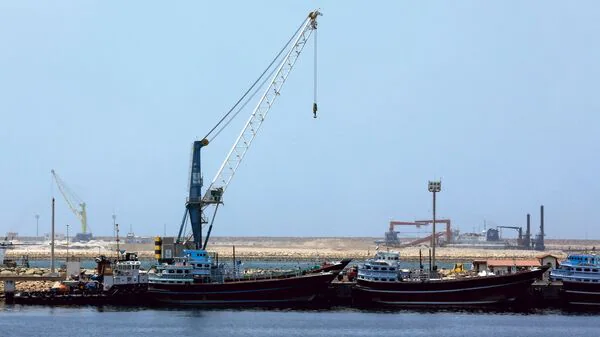
How Trump's Chabahar Port Sanction Waiver Withdrawal Puts India's Regional Ambitions At Risk
NEW DELHI : The US's move to revoke the sanctions waiver for Iran's Chabahar Port has cast uncertainty over India's regional trade strategy. The waiver had allowed Indian firms to operate the port free of US curbs, enabling New Delhi to pursue access to Afghanistan and Central Asia while bypassing Pakistan. Its withdrawal now clouds prospects for trade continuity, connectivity, and India's wider strategic ambitions .
What is the issue?Chabahar Port, located on Iran's southeastern coast along the Gulf of Oman, is India's key maritime gateway to landlocked Afghanistan and Central Asia. In 2018, the US granted an exemption to Indian entities under the Iran Freedom and Counter-Proliferation Act (IFCA), allowing them to invest in and operate the port without the threat of American curbs. On 16 September, the US announced it would revoke this waiver effective 29 September.
This move exposes Indian companies operating at Chabahar to potential sanctions, which could include freezing of assets or restrictions on their access to the US financial system. It also complicates international financing, insurance, and trade facilitation linked to the port.
The US state department said in a statement that, starting 29 September, persons operating the Chabahar Port and engaging in other related activities will face sanctions under the IFCA.
Also Read | India in Iran port pivot to skirt Hormuz Strait chokepoin Why is Chabahar Port important for India?Chabahar is central to India's regional connectivity ambitions, offering a direct trade route to Afghanistan and onward to Central Asia. India's investment has progressed in stages, beginning with a $85 million pledge for equipping the Shahid Beheshti terminal, of which about $24 million worth of equipment has been delivered. In May 2024, a 10-year contract committed $120 million for further terminal equipment and a $250 million line of credit for related infrastructure, taking total commitments to about $370 million, with a focus on container handling, cargo storage, and logistics facilities.
Strategically, Chabahar also serves as a counterweight to China's Gwadar Port in neighbouring Pakistan, which is part of the China-Pakistan Economic Corridor (CPEC). For India, it is not just a trade link but a geopolitical lever to deepen engagement with Iran, Afghanistan, and Central Asia.
How would the US move impact trade and regional connectivity?The waiver's revocation introduces operational and financial risks. Indian firms may now face delays in cargo movement due to compliance checks and banking restrictions. Projects already underway could slow down, affecting shipments of essential commodities, construction materials, and other goods intended for Afghanistan and Central Asia.
While the Indian government has indicated that it is examining the full implications, businesses fear disruptions in supply chains. Insurance for cargo may become costlier, and foreign investors could hesitate to participate in port-linked ventures.
Also Read | Why China's exports have stayed resilient in the face of Trump's tariffThe move will also have an impact on the India-Middle East-Europe Economic Corridor (IMEC), which was announced during the 2023 G20 Summit in New Delhi as a multi-modal corridor linking India's west coast ports to the UAE by sea, and onward via rail across Saudi Arabia and Jordan to Israel's Haifa port, with shipping access to Europe. Designed to rival China's Belt and Road, the IMEC could cut transit times to Europe by up to 40% compared with the Suez Canal route, offering significant savings in shipping and energy transport.
The US decision limits India's ability to integrate Chabahar as a hub connecting Central Asia and Europe through the International North–South Transport Corridor (INSTC). Without Chabahar, the IMEC's reach may remain more Gulf-centric, reducing its potential as a seamless Eurasian trade route.
What are India's alternatives to Chabahar Port?India has explored several alternatives to Chabahar to retain access to Afghanistan and Central Asia, but none offer the same efficiency or strategic leverage. Air cargo routes through Iran or Central Asia provide connectivity but are too costly for bulk shipments. Iran's Bandar Abbas port is operationally feasible but fails to bypass Pakistan, limiting its value for India's strategic calculus. Rail links through Uzbekistan or Turkmenistan could deepen regional trade ties, yet they require significant infrastructure investment and are slower. A sea-land option via Oman, involving shipments to Omani ports followed by overland transport, adds both cost and transit time. Compared with these routes, Chabahar stands out as the most practical and strategically advantageous gateway for India's regional ambitions.
Also Read | Trump's H-1B shock: Winners, losers, and what it means for your portfoli What are India's options?India may attempt diplomatic engagement with the US to seek a reconsideration or negotiate a new exemption. Parallelly, it may look for alternative financing sources, including multilateral development banks or regional partners, to shield its investment from US sanctions. Strengthening ties with Iran and Afghanistan remains crucial to keep the project operational.
The ministry of external affairs on Friday said it is carefully assessing the implications for India.“We have seen the US press statement regarding the revocation of the sanctions waiver for Chabahar Port. We are presently examining its implications for India," said MEA spokesperson Randhir Jaiswal.
Will this complicate India-US ties?India is confronting several challenges in its relationship with the US beyond Chabahar. The Trump administration has introduced a $100,000 annual fee for new H-1B visa applications , raising concerns for Indian professionals and IT firms that depend on the US market. Trade tensions have escalated after the US imposed a 50% tariff on Indian exports in August 2025, citing India's continued imports of Russian oil, leading to declining shipments and economic pressure on sectors like chemicals, metals, pharmaceuticals, and agriculture.
Legal Disclaimer:
MENAFN provides the
information “as is” without warranty of any kind. We do not accept
any responsibility or liability for the accuracy, content, images,
videos, licenses, completeness, legality, or reliability of the information
contained in this article. If you have any complaints or copyright
issues related to this article, kindly contact the provider above.


















Comments
No comment